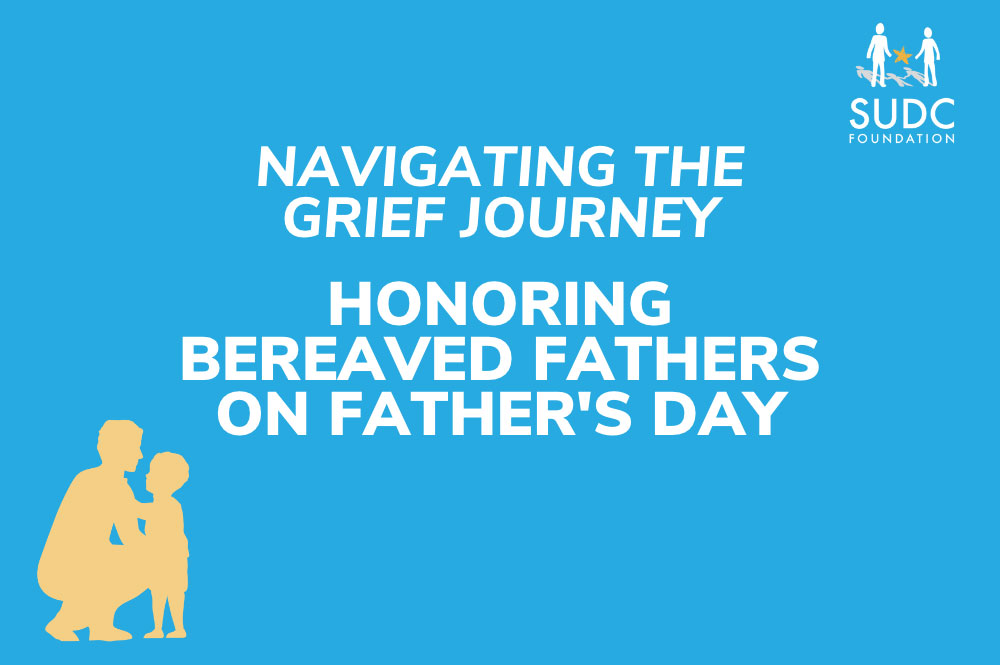
01 Jun Navigating the Grief Journey: Honoring Bereaved Fathers on Father’s Day
Written by Amanda Brindle, LSW, Associate Manager of Family Services
Father’s Day holds a unique and complex mix of emotions for bereaved fathers who have experienced the profound loss of a child. Acknowledging the significance of the grief journey and the dual process of grief, this blog seeks to validate common feelings and emotions associated with Father’s Day while emphasizing the importance of peer support, self-care, and balance. Supported by research and expert insights, we aim to provide guidance and solace to bereaved fathers on this challenging day.
Validating Common Feelings on Father’s Day:
Father’s Day can trigger a range of emotions where each one is a testament to the deep love and connection you shared with your child. It is natural to experience feelings of sadness, longing for their presence, and a profound sense of loss. Guilt may also arise, questioning whether you could have done more or different. Anger may surface, directed towards the unfairness of the situation or a sense of helplessness. It is important to validate these complex emotions as natural and normal responses to grief and loss. Allow yourself to grieve and grant permission to have mixed emotions on this day, understanding that it is part of the grieving process. Remember, the depth of these feelings reflects the depth of the love you hold for your child, and it is okay to honor and express them in your own unique way.
Embracing Peer Support:
Connecting with others who have walked a similar path can provide profound support on the grief journey. Engaging in peer support allows you to share experiences, emotions, and challenges with individuals who understand and empathize. Research indicates that peer support can reduce feelings of isolation and offer a safe space for healing (Mellor, 2012). Seeking out bereavement support groups or connecting with fellow bereaved fathers can provide comfort, validation, and a sense of community.
Nurturing Self-Care:
Grief can take a toll on your physical, mental, and emotional well-being, making self-care essential. Engage in activities that promote self-care, such as exercise, meditation, spending time in nature, or pursuing creative outlets. Prioritizing self-care allows you to recharge, restore balance, and cultivate resilience as you navigate the grief journey (Currier et al., 2008).
Striving for Balance:
Navigating the grief journey involves understanding the dual process of grief: the oscillation between loss-oriented tasks and restoration-oriented tasks (Stroebe, Schut, & Stroebe, 2007). While mourning the loss of your child is important, it is equally essential to engage in activities that bring you joy, purpose, and connection. Strive for a healthy balance between honoring your grief and embracing life’s moments of happiness. It is okay to find solace in celebrating the love and cherished memories you shared with your child, even amidst the pain of grief. Embracing this dual process allows you to honor your child’s legacy while taking steps towards healing and finding moments of fulfillment in your daily life. Remember, finding balance is a personal journey, and it is okay to adjust and adapt as needed to navigate this complex terrain of grief and healing.
As we honor bereaved fathers on this Father’s Day, let us validate the wide range of emotions experienced and the complex journey of grief. Embrace peer support as a source of comfort and understanding, allowing you to share your grief and connect with others who truly comprehend your experience. Nurture self-care practices to restore and replenish your well-being. Remember, your feelings are valid, and there is no one “right” way to navigate Father’s Day while grieving.
If you are seeking to give or receive peer support, we encourage you to explore the Peer Connection Program offered by the SUDC Foundation. Through this program, you can connect with fellow SUDC dads who have walked a similar path. To learn more about this program, visit https://sudc.org/peer-connections-program/.
May this day be a reminder of the love you shared with your child and a testament to the strength and resilience of bereaved fathers.
References:
Currier, J. M., Mallot, J., Martinez, T. E., & Sandy, C. (2008). Bereavement, religion, and mental health: No evidence for spiritual buffering in the experience of complicated grief. Anxiety, Stress & Coping, 21(4), 361-377.
Mellor, P. (2012). Peer support in mental health services: Where is the research taking us, and do we want to go there? Journal of Mental Health, 21(6), 611-622.
Stroebe, M., Schut, H., & Stroebe, W. (2007). The dual process model of coping with bereavement: Rationale and description. Death Studies, 31(9), 849-861.


